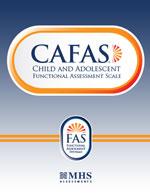
Child and Adolescent Functional Assessment Scale® cafas
Author: Kay Hodges, Ph.D., ABPP
Age: 5 - 19
Admin Time: 10 minutes
Admin Type: Professional, Interview
Format: Hand-scored
Printed Manuals
Physical printed manuals.
Books & Workbooks
Click to browse products
Online Forms, Reports, Kits & e-Manuals
All online resources including Forms, Reports, i-Admins, Kits and e-Manuals.
Printed Forms & Handscoring Materials
Test forms, response booklets and scoring reference manuals.
Blank Scoring Forms for the CAFAS Self-Training Manual
CAFAS Agency Reference Manuals, Both Sets (CAF104 & CAF105)
CAFAS Booster I Manual
CAFAS Booster I Manual: Blank Scoring Form
CAFAS Booster II Manual
CAFAS Booster II Manual: Blank Scoring Form
CAFAS Booster III Manual
CAFAS Booster III Manual: Blank Scoring Form
CAFAS Manual for Coordinators, Administrators & Data Managers
CAFAS Self-Training Manual
CAFAS Evidence-Based Treatments for Children and Adolescents
CAFAS Supplemental Vignettes
CAFAS Young Adult Version
FASOutcomes Web-Hosted CAFAS Assessments
CAFAS Checklist: Adult Informant Version (25)
CAFAS Checklist: Youth Version (25)
CAFAS Forms with Strengths and Goals (25)
CAFAS Parent Interview (Parent Report) (25)
Assess a child or youth’s day-to-day functioning and track changes over time
Overview
The CAFAS® is the gold standard tool for assessing a youth’s day-to-day functioning and for tracking changes in functioning over time. The CAFAS is backed by over 20 years of research supporting its validity and sensitivity to detecting change in behaviours. It is widely used to inform decisions about type and intensity of treatment, level of care, placement and need for referral.
Correlates with actual intensity of treatment, involvement with juvenile justice, school-related problems and child and family risk factors
Predicts restrictiveness of care, total cost of all services received, number of bed days and number of days of service six and twelve months post-intake
Predict future contact with the law and poor school attendance
How to use
For each subscale, the rater reads through the items at each level, starting at the Severe level, until they find a description of the child or youth. Once a description has been found, the child or youth is assigned the item’s corresponding score for the subscale. After assigning the subscale score, the rater moves on to the next subscale.
Reliability and validity
The psychometric properties of the CAFAS have been investigated extensively with diverse samples of youth. Studies have found considerable evidence of the reliability and validity of the CAFAS. The measure has demonstrated both concurrent and predictive validity in studies operating in applied clinical settings. CAFAS scores have been found to do the following:
Correlate with intensity of treatment, involvement with juvenile justice, school-related problems, and child and family risk factors
Predict restrictiveness of care, total cost of all services received, number of bed days, and number of days of service 6 and 12 months post-intake
Predict future contact with the law
Predict poor school attendance
 NZ
NZ




